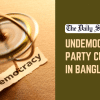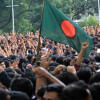AL policy favouring oligarchs dampened economy

The Awami League government favoured the super-rich who controlled capital and laundered the funds aboard, dampening the country's economy.
Meanwhile, ousted prime minister Sheikh Hasina had announced a zero-tolerance policy towards corruption, which is the "biggest mockery of the century", former central bank chief economist Birupaksha Paul has said.
The professor of economics at the State University of New York at Cortland in the US discussed disproportionate economic growth, tampered data, the link between democracy and development, and many other issues in an interview with The Daily Star last week.
He said the AL's economic policy was gradually being biased towards the super-rich who already occupied means of production, capital, and land in this land-scarce country.
The faulty economic policy heavily affected financing through banks, and the capital market malfunctioned. "So, in these cases, the Awami League did not do a good job at all," Paul said.
He said surrendering to the oligarchs and pampering the super-rich despite being a grassroots party ruined the AL's foundational ethics, and it deviated from its own commitments.
"And the super-rich not just only controlled capital, they also laundered a huge part of it," he said.
The market economy was introduced in the early 90s to get rid of monopolies, but the AL created some government-sponsored monopolies, Paul said.
"Someone is controlling everything. Someone is controlling the gold industry, someone is controlling the banking industry, and someone is capturing seven banks.
"Why were you [Hasina] telling the zero-tolerance thing when people very close to you were hugely corrupt? Even before the mass uprising, this fact was divulged by the media, but the government did not take any steps," he said.
DATA
Paul also questioned the data of economic indicators. Even if the World Bank's calculation that Bangladesh's average GDP growth was 5 percent in the past one and a half decades is true, the rate is not bad, he said.
"The problem is that growth does not necessarily indicate development or address income inequality. The most shocking part is – you are growing, but you are growing disproportionately."
The growth is coming from the industrial sector, very specifically just from garments and middlemanship with very little value addition, said the economist.
Unlike politicians, economists have been very serious about the integrity of data. However, data were not reliable because of tampering by some ministers to show high per capita income and growth, and low inflation and unemployment.
"The government was not serious about integrity and honesty of the policy. And the Awami League paid the price," Paul remarked.
DEMOCRACY AND DEVELOPMENT
There are some ideal stories where countries like England show that democracy and development are not mutually exclusive, Paul said. "Actually, democracy can make a better way of development."
He thinks there was democracy initially during the AL's tenure, but later the government started saying that development is very important for democracy.
For a strong democracy, institutions must be powerful, but in Bangladesh, institutions were run by mainly people obedient to the government. "The best example was retired bureaucrats, who wouldn't say anything and were not innovative at all," Paul said.
"Although South Korea is developing, why North Korea could not do this? The same people, same culture, but they did not create the institutions. Now, South Korea's income is more than 10 times higher than North Korea."
The AL showed that there were institutions in the country, but even the judiciary, the Anti-Corruption Commission, the Competition Commission, banks, capital market – all were corrupt, said Paul.
"One [AL] leader made 360 houses in London, in England, and without any accountability. Even the prime minister knew about this but did not take any step.
"That's why I said that zero tolerance towards corruption is the biggest mockery of the century."
The East Asian nations invested a lot of money in research, education and health while these sectors are hugely neglected or sometimes totally politicised in Bangladesh, Paul pointed out.
"We cannot improve our educational rankings because we've put all the political people in the institutions and politicised the campuses. Now the interim government has done something like banning one party, one student front. Why not all student fronts?"
Paul hailed incumbent Bangladesh Bank Governor Ahsan H Mansur for fighting against inflation.
To tame inflation, Paul advised the authorities to keep the supply chain mechanism friendly to the consumers, and prevent extortions at all levels.
"And a reliable data mechanism should be introduced so that producers can make decisions properly."
Paul recommended abolishing the Financial Institution Division under the finance ministry to ensure minimum influence of the government in the banking sector.
He suggested passing a fiscal responsibility law to ensure fiscal discipline, transparency, and long-term sustainability of public finances.
The economist also recommended restructuring the time of the fiscal year, starting from January instead of July.


 For all latest news, follow The Daily Star's Google News channel.
For all latest news, follow The Daily Star's Google News channel. 








Comments